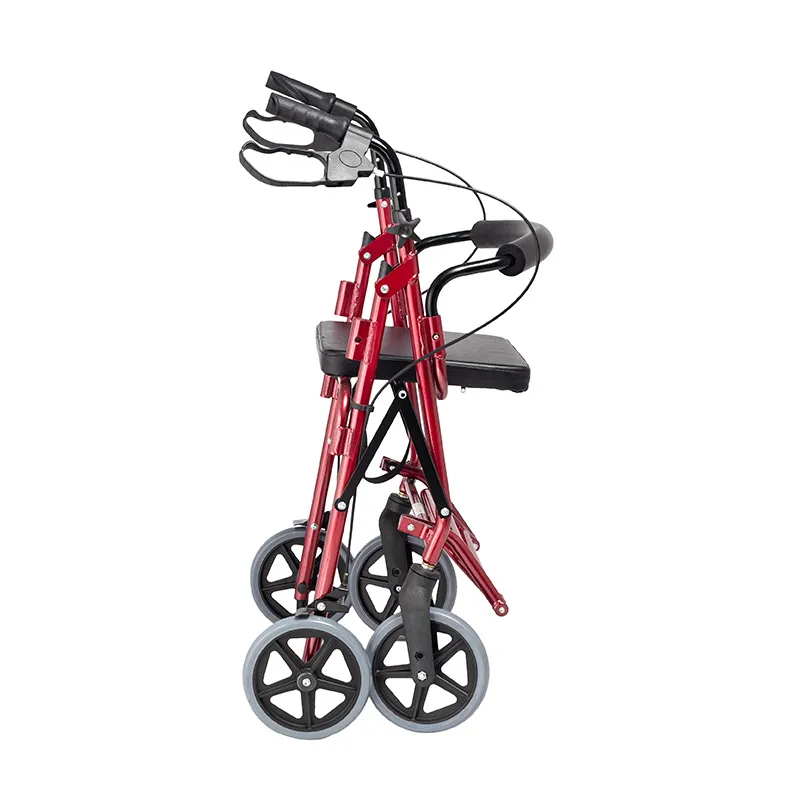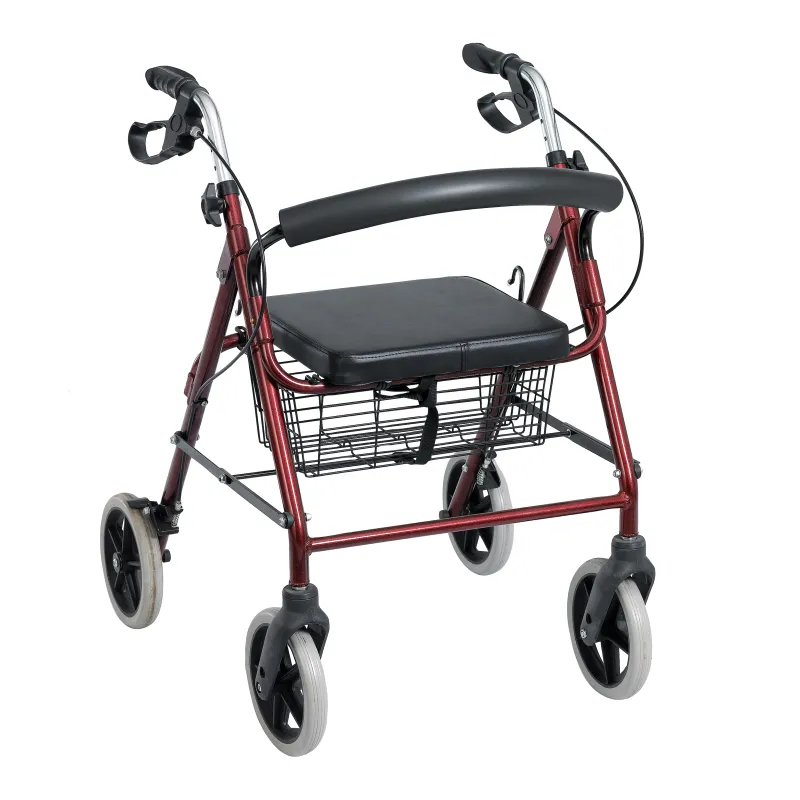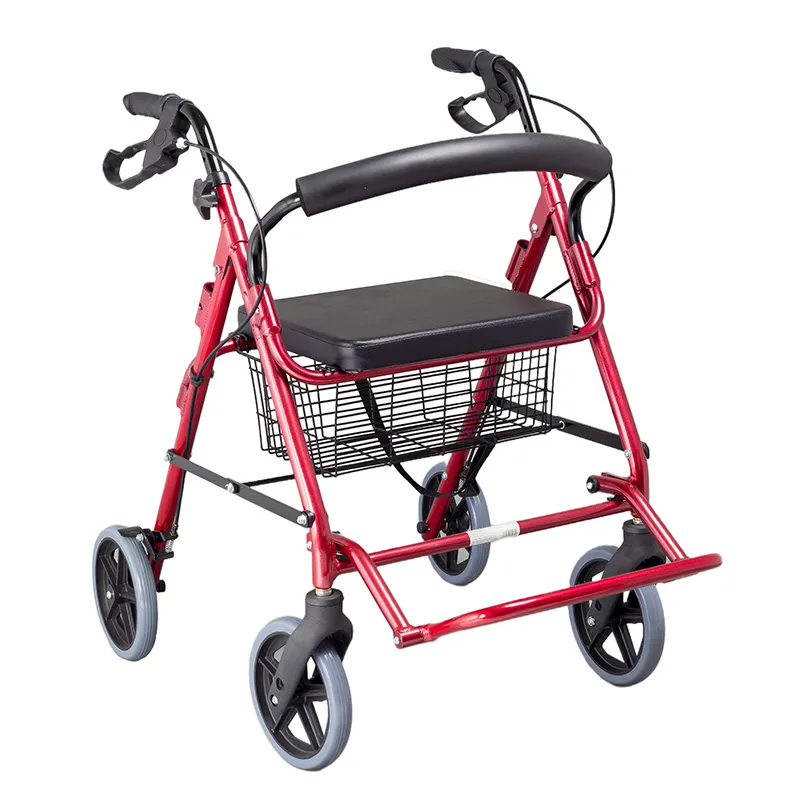
What are the advantages and disadvantages of rollator walker?
2024-07-08 15:30
As a common medical assistive device, rollator walker is widely used by the elderly, people with limited mobility and patients in rehabilitation. It plays an important role in improving users' walking ability, enhancing independence and preventing falls.
However, there are also some disadvantages of rollator walker that cannot be ignored during use. This article will explore the advantages and disadvantages of rollator walker in depth to provide readers with a comprehensive understanding and scientific basis for selection.

What are the types of rolling walker?
Before analyzing the advantages and disadvantages of rollator walker, we need to understand the main types of rollator walker. According to different designs and functions, rollator walker is mainly divided into the following types:
1. Standard rolling walker
Standard rollator walker usually has no wheels and requires users to move by lifting. It provides maximum stability and support, suitable for users who need a high degree of support.
2. Two-wheeled rollator walker
The two-wheeled rollator walker has two wheels in front and non-slip foot pads in the back. Users only need to lift the rear foot pads to push, which is suitable for users who need some support but can still partially bear weight.
3. Four-wheeled rollator walker
The four-wheeled rollator walker is equipped with four wheels, which provides better mobility and flexibility. It is usually equipped with a brake system and a seat, which is suitable for users who need a larger range of motion.
4. Lightweight folding rolling walker
The lightweight folding rollator walker is compact in design and light in weight, easy to carry and store, and suitable for users who need to move frequently and go out.
What are the advantages of the rollator walker?
1. Provide support and stability
The main advantage of the rollator walker is that it provides reliable support and stability to help users maintain balance while walking. Especially for the elderly and patients in rehabilitation, the rollator walker can significantly reduce the risk of falling and improve safety.
2. Enhance independence
The rollator walker helps users walk independently without the assistance of others, enhancing their autonomy and self-confidence. For patients who have been bedridden for a long time or have difficulty in moving, the rollator walker is an important tool to restore the ability to walk.
3. Promote rehabilitation
In rehabilitation training, the rolling walker provides the necessary support to help patients gradually regain the ability to walk. By using a rolling walker, patients can perform targeted gait training and improve muscle strength and balance.
4. Multifunctional use
Modern rollator walkers are designed in a variety of ways and have a variety of functions. For example, a four-wheeled rollator walker is usually equipped with a seat and a storage basket, where users can sit down and rest when they are tired, or carry personal items, providing more convenience and comfort.
5. Easy to carry and store
Many rolling walkers are designed to be lightweight and have a folding function, which is easy to carry and store. For users who need to go out for activities or travel, lightweight folding rolling walkers provide great convenience.

What are the disadvantages of rollator walkers?
1. Difficulty of adaptation
For some users, especially the elderly who use a rollator walker for the first time, it may take time to adapt and learn how to use the rollator walker correctly. When used for the first time, if it is not operated properly, it may increase the risk of falling.
2. Portability issues
Although lightweight folding rollator walkers are easy to carry, some standard rollator walkers or four-wheeled rollator walkers are still inconvenient to carry and store due to their large structure and heavy weight. Especially when you need to go up and down stairs or take public transportation, it may cause inconvenience.
3. Terrain restrictions
When using a rolling walker, the rolling walker is greatly affected by the terrain. On rugged or narrow roads, the mobility and stability of the rollator walker will be limited, and it may not provide sufficient support and safety.
4. Psychological dependence
After using the rolling walker for a long time, some users may develop psychological dependence, over-relying on the rolling walker and ignoring the recovery of their own walking ability. Especially in rehabilitation training, if you rely too much on the rollator walker, it may affect the rehabilitation effect.
5. Cost issues
High-quality rollator walkers are expensive. For families with poor economic conditions, buying a rollator walker may bring a certain financial burden. In addition, the accessories and maintenance costs of some rollator walkers cannot be ignored.

Actual case analysis
In order to better understand the advantages and disadvantages of the rollator walker, let's look at a few actual cases:
Case 1: Daily use of the elderly
Ms. Zhang, 75 years old, has difficulty walking due to her old age and knee arthritis. Her family bought her a four-wheeled rollator walker. After using it, Ms. Zhang said: "The rollator walker allows me to walk independently at home and in the community. I no longer need my children to support me all the time, and my ability to take care of myself has been greatly improved."
Advantages:
It provides good support and stability.
Equipped with a seat and a storage basket, it is convenient to go shopping and rest.
Disadvantages:
Because the rollator walker is large, it is not convenient for Ms. Zhang to use it in the narrow corridors and bathrooms at home.
Case 2: Rehabilitation of stroke patients
Mr. Li, 60 years old, suffered from hemiplegia due to a stroke. During rehabilitation training, he used a two-wheeled rollator walker. Mr. Li said: "The rolling walker played a big role in my rehabilitation training. It gave me support when walking and helped me gradually regain my sense of balance."
Advantages:
It provides the necessary support to help Mr. Li with rehabilitation training.
Light weight, easy to carry and use.
Disadvantages:
When used outdoors, it is difficult to move due to uneven ground.
Conclusion
Rolling walkers have significant advantages in improving the walking ability of the elderly and those with limited mobility, including providing support and stability, enhancing independence, promoting rehabilitation, and multifunctional use. However, rollator walkers also have disadvantages such as difficulty in adaptation, portability issues, terrain restrictions, psychological dependence, and cost during use.
It is hoped that the analysis and suggestions in this article can provide readers with valuable references and help them make wise decisions when purchasing and using rollator walkers.








